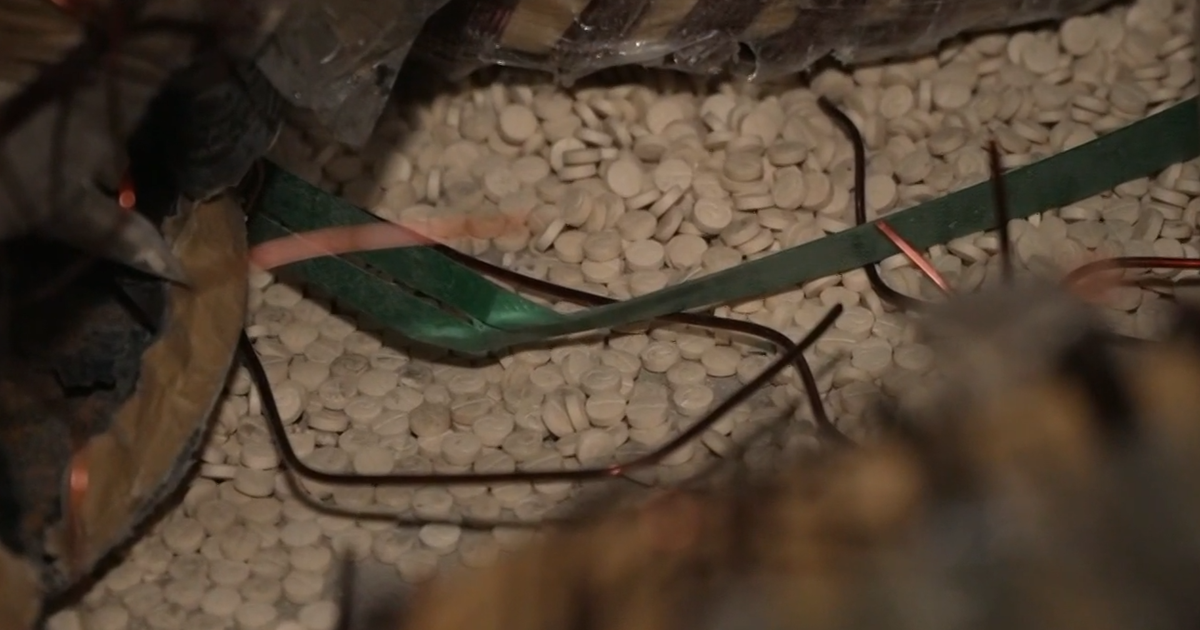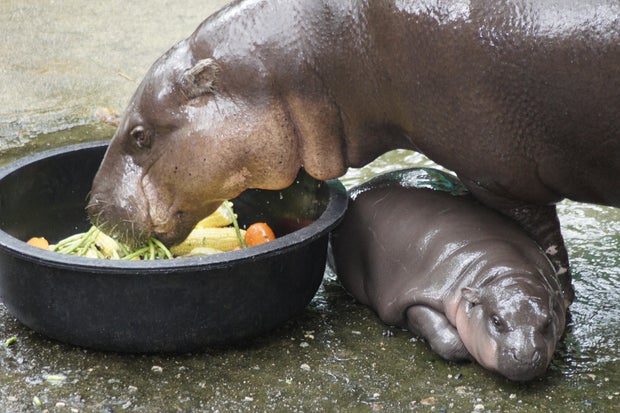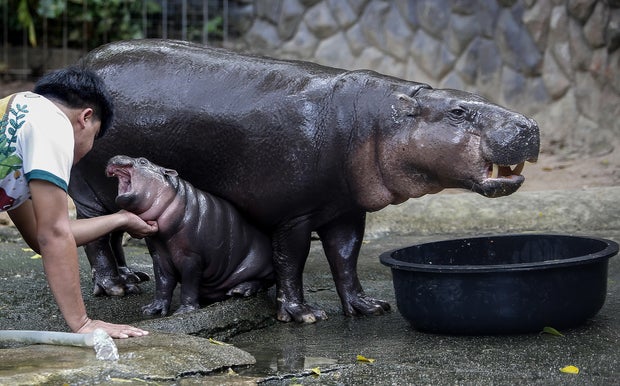CBS News
Moo Deng the baby hippo finds fame as a small Thai zoo’s online “bouncy pork” sensation

Chonburi, Thailand — Only a month after Thailand’s adorable baby hippo Moo Deng was unveiled on Facebook, her fame became unstoppable both domestically and internationally. Zookeeper Atthapon Nundee has been posting cute moments of the animals in his care for about five years. He never imagined Khao Kheow Open Zoo’s newborn pygmy hippo would become an internet megastar within weeks.
Cars started lining up outside the zoo well before it opened Thursday. Visitors traveled from near and far for a chance to see the pudgy, expressive 2-month-old in person at the zoo about 60 miles southeast of Bangkok. The pit where Moo Deng lives with her mom, Jona, was packed almost immediately, with people cooing and cheering every time the pink-cheeked baby animal made skittish movements.
“It was beyond expectation,” Atthapon told The Associated Press. “I wanted people to know her. I wanted a lot of people to visit her, or watch her online, or leave fun comments. I never would’ve thought (of this).”
Carola Frentzen/picture alliance/Getty
Moo Deng, which literally means “bouncy pork” in Thai, is a type of meatball. The name was chosen by fans via a poll on social media, and it matches her other siblings: Moo Toon (stewed pork) and Moo Waan (sweet pork). There is also a common hippo at the zoo named Kha Moo (stewed pork leg).
“She’s such a little lump. I want to ball her up and swallow her whole!” said Moo Deng fan Areeya Sripanya while visiting the zoo Thursday.
Already, Moo Deng has been made into memes. Artists are drawing cartoons based on her. Social media platform X even featured her in its official account’s post.
With all that fame, zoo director Narongwit Chodchoi said they have begun patenting and trademarking “Moo Deng the hippo” to prevent the animal from being commercialized by anyone else. “After we do this, we will have more income to support activities that will make the animals’ lives better,” he said. “The benefits we get will return to the zoo to improve the life of all animals here.”
The zoo sits on almost 2,000 acres of land and is home to more than 2,000 animals. It runs breeder programs for many endangered species, including Moo Deng’s. The pygmy hippopotamus that’s native to West Africa is threatened by poaching and loss of habitat. There are only 2,000-3,000 of them left in the wild.
Carola Frentzen/picture alliance/Getty
To help fund the initiative, the zoo is making Moo Deng shirts and pants that will be ready for sale at the end of the month, with more merchandise to come.
Narongwit believes a factor of Moo Deng’s fame is her name, which compliments her energetic and chaotic personality, as captured in Atthapon’s creative captions and video clips.
Appropriately, Moo Deng likes to “deng,” or bounce, and Atthapon has posted a lot of cute moments of her bouncing giddily on social media. Even when she’s not bouncing, the hippo is endlessly cute — squirming as Atthapon tries to wash her, biting him while he was trying to play with her, calmly closing her eyes as he rubs her pinkish cheeks or her chubby belly.
Atthapon, who has worked at the zoo for eight years taking care of hippos, sloths, capybaras and binturongs, said baby hippos are usually more playful and energetic, and they become calmer as they get older.
The zoo has seen a spike in visitors since Moo Deng’s fame — so much that it now has to limit public access to the baby’s enclosure to 5-minute windows during weekends.
Chaiwat Subprasom/SOPA Images/LightRocket/Getty
Narongwit said the zoo has been receiving over 4,000 visitors during weekdays, up from around 800 previously, and more than 10,000 during a weekend, up from around 3,000.
But the fame has also brought some hostile visitors to Moo Deng, who only spends about two hours a day awake and ready to play. Some videos showed visitors splashing water or throwing things at the sleeping baby hippo to try to wake her up. The hippo pit now has a sign warning visitors against throwing things at Moo Deng — posted prominently at the front in Thai, English and Chinese.
Narongwit said the zoo would take action under the animal protection law if people mistreat the animal. The zoo director said that since clips emerged online of people treating Moo Deng poorly, drawing a fierce backlash, they haven’t seen anyone engaging in such behavior.
For fans who can’t make the journey or are discouraged after seeing the crowds for Moo Deng, the Khao Kheow Open Zoo set up cameras and plans to start a 24-hour live feed of the baby hippo in the coming week.
CBS News
A look inside the U.S.-Mexico border

Watch CBS News
Be the first to know
Get browser notifications for breaking news, live events, and exclusive reporting.
CBS News
New details of notorious Captagon drug trade exposed with collapse of Syria’s Assad regime

Damascus — In a remote corner outside Damascus, a now abandoned potato chip factory has shone a light on one of the ousted Bashar al-Assad regime’s many dark, but open secrets.
A CBS News team gained access to the site, finding a storeroom lined with hydrochloric acid and acetic acid on an industrial scale, which are precursor chemicals needed to make Captagon, one of the most popular street drugs in the Middle East and beyond.
Ahmed Abu Yakin is with Syria’s Hayat Tahrir al-Sham, or HTS, one of the main groups in charge of the country after Assad fled on Dec. 8. Yakin says this massive underground stash of Captagon was found just days after the rebel group’s takeover. The pills stuffed into large stacks of household volt regulator kits ready for shipment.
Often referred to as “poor man’s cocaine,” Captagon is a highly addictive amphetamine-type stimulant.
“We feel bad for the young people who were addicted to it,” Yakin said. “The Assad regime was destroying a generation and couldn’t care less. They only cared about making money.”
And that money is staggering. Analysts estimate the Assad regime raked in $5 billion per year from the trade, dwarfing Syria’s official budget and making it a vital lifeline for the bankrupted state. The drug costs just pennies to make but can sell for up to $20 for a single tablet. The haul seen at the abandoned factory is potentially worth tens of millions of dollars.
For years, neighboring countries accused Assad’s Syria of being the world’s main supplier of the illegal drug. In March 2023, the U.S. Treasury Department sanctioned several Syrians for their alleged involvement in the “dangerous amphetamine”, including two of Assad’s cousins.
“Syria has become a global leader in the production of the highly addictive Captagon, much of which is trafficked through Lebanon,” said Andrea Gacki at the time, who was then-director of the Treasury Department’s Office of Foreign Assets Control. “With our allies, we will hold accountable those who support Bashar al-Assad’s regime with illicit drug revenue and other financial means that enable the regime’s continued repression of the Syrian people.”
Now, his wildly lucrative drug business appears to have been crushed, along with his brutal and corrupt regime. For Yakin, Captagon has no place in Syria’s future.
“We will destroy it all,” Yakin said. “We will eliminate anything that has to do with drugs, and anything that has to do with the criminal Assad regime.”
CBS News
Luigi Mangione’s lawyer says he plans to waive extradition to New York

Watch CBS News
Be the first to know
Get browser notifications for breaking news, live events, and exclusive reporting.











